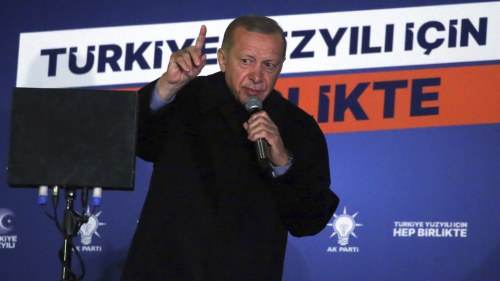Turkish Election Takeaways

Turkish Election Could Spell End to Erdogan Era
As Turkey's presidential election heads to an unprecedented runoff, the stakes are high. After more than 20 years in power, President Recep Tayyip Erdogan faces perhaps his toughest challenger yet in Kemal Kilicdaroglu, a coalition candidate promising reform as domestic conditions deteriorate.
“Allegations of rampant corruption and nepotism, skyrocketing inflation, soaring unemployment, and an unmitigated refugee crisis at home make it near impossible for candidate Erdogan to champion a convincing narrative of change,” Nonresident Senior Fellow Sibel Oktay writes in Responsible Statecraft. “This is perhaps the opposition coalition’s best chance yet to replace a highly corrupt regime that has eroded Turkey’s democracy, economy, and social fabric in the last two decades.”
And a Kilicdaroglu victory could have a major impact on Turkey’s often thorny relationship with the United States and other Western allies. “The first thing it will do, presumably, is allow Sweden to come into NATO,” Council President Ivo Daalder tells GZERO World.
The Data Dimension
As Turkey balances competing interests from both the East and West, where does the public think the government should focus? Polling finds Turks are deeply divided on the direction their country’s foreign policy should take going forward, with a plurality (39%) in favor of prioritizing relations with the United States and the European Union, a third (30%) in support of prioritizing Russia and China, and another third (31%) undecided. Benjamin Tomas Morgan offers more analysis in our Running Numbers blog.
What We're Watching
- El Salvador’s gang crackdown: Mass arrests under the Bukele administration have reduced crime in the short-term, but at a significant cost to human rights. Research Assistant Emma Sanderson digs deeper in Global Insight.
- Sudan’s spillover effect: "The longer the conflict goes on, the more likely neighbors start choosing sides, raising the risk of sustained fighting in the long term," Senior Fellow Elizabeth Shackelford writes in her latest for the Chicago Tribune.
- South Korean military spending: Karl Friedhoff, Marshall M. Bouton Fellow for Asia Studies, unpacks how an aging population and fiscal conservatism are shaping President Yoon Suk-yeol's inaugural defense budget in NK News.
- American engagement in the Middle East: The US military footprint in the region is undermining its strategic priorities in other parts of the world, Nonresident Fellow Paul Poast argues in World Politics Review.
Ask an Expert
What do Ukrainians see as their most important goal as the war with Russia continues?

“Yes, the short-term and the counteroffensive is important. Yes, providing military assistance to Ukraine is vital. But what really matters is the long-term and the political relationship between Ukraine and the West, because that's going to determine how Ukraine will turn out.”
—Council President Ivo Daalder speaking about his recent trip to Kyiv on Deep Dish

